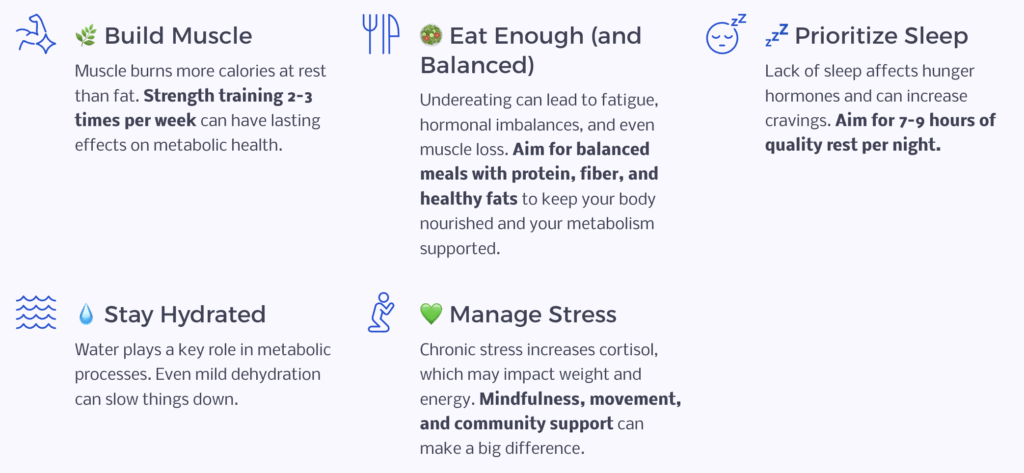Debunking Metabolism Myths: What Science Really Says
November 17, 2025
Confused about metabolism and weight loss? Learn what science really says as we debunk common metabolism myths and share practical tips for supporting your health.
We hear it all the time: “I just have a slow metabolism.” Or “Eat this to boost your metabolism instantly!” But how much of what we believe about metabolism is actually true?
At NiuOla Health in Olympia, Washington, we believe in empowering you with science-based, compassionate guidance especially when it comes to your health and weight. Let’s clear up some common metabolism myths and explore what your body really needs to thrive.
What Is Metabolism, Really?
Metabolism is the process your body uses to convert the food you eat into energy. It powers everything from breathing to thinking to physical activity. Your basal metabolic rate (BMR) is the number of calories your body uses at rest that makes up the bulk of your daily energy use.
But here’s the key: Metabolism is not fixed. It’s dynamic, influenced by many factors, including age, muscle mass, hormones, sleep, and even stress levels.

Myth #1: “Some people are just born with fast or slow metabolisms.”
✅ The Truth:
While genetics do play a role, they’re not the whole story. Most people’s BMRs don’t vary as widely as we think. According to a large study published in Science (2021), metabolic rates remain surprisingly stable from age 20 to 60 and only gradually decline afterward, not drastically in your 30s, as once believed.
Lifestyle factors like movement, strength training, and sleep often have more impact than genes alone.

Myth #2: “Metabolism slows down significantly with age.”
✅ The Truth:
Yes, metabolism can decrease slightly as we age but it’s often due to loss of muscle mass, not age itself. As we become less active, we tend to lose lean body mass, which burns more calories than fat.
Building or maintaining muscle through resistance training (even bodyweight exercises) can help support a healthy metabolism at any age.
Myth #3: “Skipping meals slows down your metabolism.”
The idea that skipping meals causes your body to “go into starvation mode” is overstated. In fact, some research supports intermittent fasting as a helpful tool for certain people, without harming metabolism.
That said, going too long without eating can affect blood sugar, energy levels, and mood, especially for those with underlying health conditions. The key is to find a rhythm that works for your body and supports consistent, nourishing intake.
Myth #4: “Eating spicy foods or drinking green tea will speed up your metabolism.”
✅ The Truth:
Yes, capsaicin (from chili peppers) and catechins (in green tea) may give your metabolism a tiny temporary boost but it’s not enough to make a meaningful difference in weight.
Instead of relying on metabolism “hacks,” focus on sustainable habits like:
- Eating whole, fiber-rich foods
- Prioritizing protein
- Moving your body daily
- Managing stress and sleep
Myth #5: “Thin people have faster metabolisms.”
✅ The Truth:
Surprisingly, larger bodies often have higher resting metabolic rates, because they require more energy to function. Being thin doesn’t automatically mean someone burns more calories.
This is why weight alone is never the full picture of health or metabolic function.
Supporting Your Metabolism: What Does Work
Rather than focusing on trying to “boost” your metabolism with fads, try these science-backed strategies:

If you’ve struggled with weight or energy and feel like your body is working against you please know: you are not lazy, and your metabolism is not broken. Every body is different, and there is no one-size-fits-all solution.
At NiuOla Health, we take a whole-person approach to wellness, blending evidence-based care with empathy. Whether you’re working on weight loss, metabolic health, or simply feeling better in your body, we’re here to support you, no judgment, just care.
Ready to Work with Your Body, Not Against It?
If you’re in the Olympia, WA area and looking for compassionate, personalized care that helps you understand your body not shame it and we’d love to meet you.
Schedule a consultation with Dr. Tui Lauilefue
Let’s create a care plan that honors your unique body, your goals, and your life.